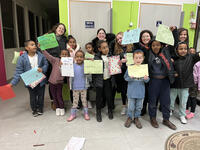Following Hamas’ massacre on October 7th, the Zahava and Moshael Straus Center for Torah and Western Thought has contributed greatly toward defending and supporting Israel. Throughout October and November, staff, faculty, and students have published numerous articles, joined multiple podcasts and a TV segment, and delivered several lectures and classes to inform and educate audiences. Beyond the intellectual and media landscape, one of our Straus Scholars, Adina Feldman (SCW ‘26), traveled to Israel to provide direct support to people in need.
The great geographic distance between America and Israel did not deter Ms. Feldman. “The need to do something productive, to feel useful, was totally overwhelming, and yet despite my efforts, it was a need I couldn’t seem to satisfy,” said Adina. “I felt like I was running on a treadmill, breathless, exhausted, and going nowhere.” As the war raged on, Adina decided to leverage her prior connections in Israel to pursue a unique avenue of aid. This past August, she had completed a year of Sheirut Leumi (national service) in an Ethiopian Absorption Center in Jerusalem, which left her with a job, community, and practical configurations that lined up for her contribution.
Upon arrival, Adina encountered a changed world, with the school operating at 50% attendance due to its bomb shelter’s limited capacity, which required students to come in on rotation. The situation was weighing heavily on the students. “I was still sore from spending my summer trying to keep a particularly rambunctious group of seventh graders out of trouble, and I was excited to see them again,” remarked Ms. Feldman. “But I found them deeply and significantly altered by the sights and sounds of October 7th, their rowdiness replaced with an eerie calm.” Adina invited the students to join her in volunteering around other parts of the city, helping to transform their anxiety into excited readiness to pack boxes, visit hospitals, and bake cookies for soldiers. Adina and her group of 12-year olds provided heavy-duty cleaning of apartments before displaced families would move in – mopping floors, stocking pantries, and setting up linens.
Adina noted that during these activities, “the students let go of some of that terror and lifelessness they had absorbed after October 7th.” These contributions “gave them a sense of purpose and control, but it was deeper than that.” As Adina put it, “It was as if the recognition that they were part of a bigger whole that depended on them was exactly what was needed to reignite that spark of vitality.” Adina mentioned that she saw much of her own journey reflected in their daily excursions.
Shortly after returning to the United States and resuming her studies at Stern College, Ms. Feldman joined the annual Shabbaton of the Straus Center, where she is proud to be a member of its newest cohort of students. Rabbi Meir Soloveitchik, the director of the Straus Center, delivered several lectures during the Shabbaton, which was a profoundly enriching experience for Adina.
“One lecture resonated with me particularly, and I felt that it gave voice to many of my reflections of my recent travels,” she remarked. “Rabbi Soloveichik spoke of examples of certain Jews forming unlikely and yet impactful partnerships. What allowed for their surprising unity was what he called a ‘reverence for the Jewish story’ – a moment that crystallizes the continuous unfolding of Jewish history – and the importance of our part in it all.”
These moments, concluded Ms. Feldman, give us pause for reflection but simultaneously demand action. Her trip to Israel was inspired by a recognition of her own role to play in the greater Jewish story. “October 8th was day one for all of us – day one of that renewed reverence for our story, day one of a renewed effort to find our places within it, and day one of a collective commitment to that something eternal, our story that transcends bereavement and terror, igniting a new chapter.”

